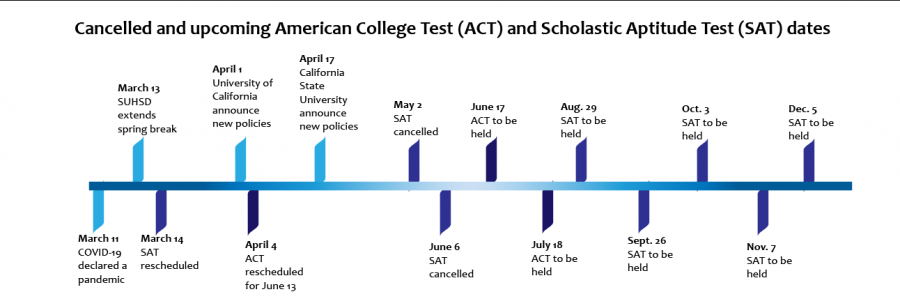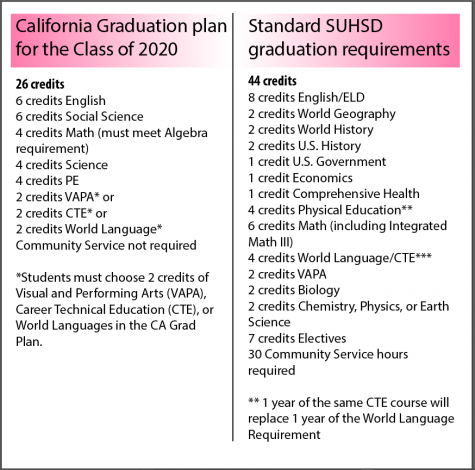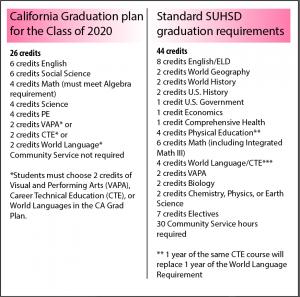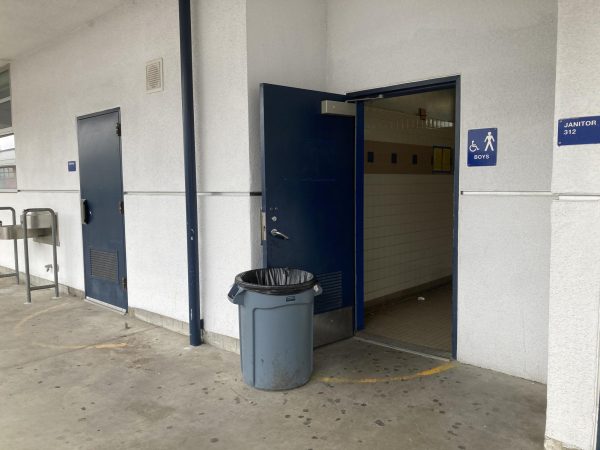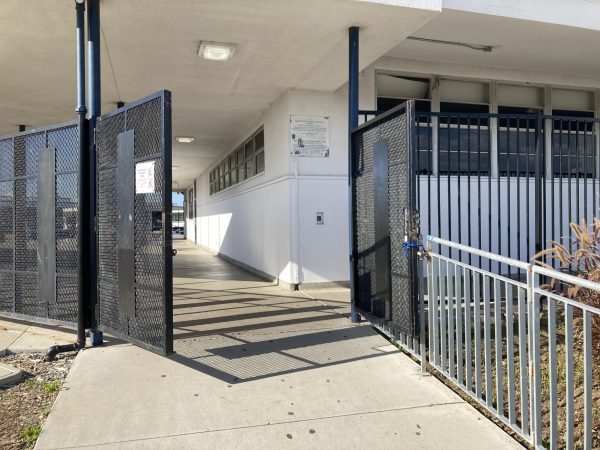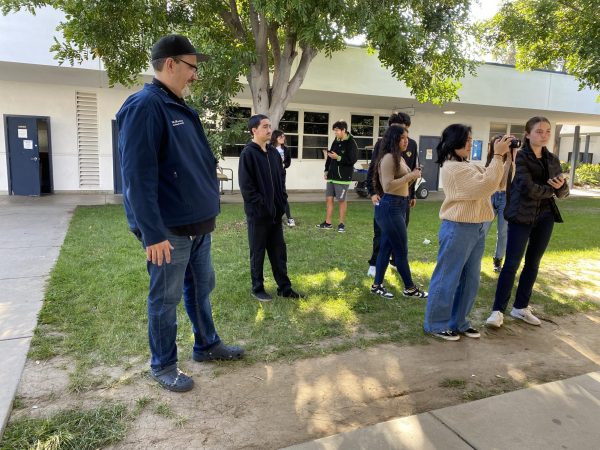The spread of test-optional admissions
Universities across the nation change 2021 admissions requirements
Information gathered from the College Board website, ACT website and EdSource.
The University of California (UC) and California State University (CSU) are some of the many universities across the nation that have announced altered admission requirements for the class of 2021 in the past months. Current juniors now face more test-optional applications due to the restricted testing availability caused by COVID-19 precautions .
While discussions regarding these new decisions are still being made, Scholastic Aptitude Test (SAT)/American College Testing (ACT) and minimum grade requirements are two of the primary aspects being altered by university admissions offices. While San Diego State University (SDSU) normally uses the Eligibility Index, which creates a score based on one’s Grade Point Average (GPA) and test score, to consider applicants, this will not be the case for the upcoming application group.
“Now that the CSU isn’t requiring the SAT it’s up to each campus to determine what their different criteria will be in considering students. [Impacted campuses that get more applications] can’t just look at bare-bones minimum criteria and say ‘Oh okay, well you’re meeting minimum criteria, so you’re good to go.’ Now it comes down to each individual campus looking at best practices, looking at what we’re doing and looking at how to be able to accommodate criteria for fall 2021,” SDSU Admissions Counselor Esther Rodriguez said.
While SDSU is the closest CSU to Bonita Vista High (BVH) and 14% of BVH’s class of 2019 enrolled at SDSU, there are an additional 22 CSU campuses. The CSU announced their new policy, which will apply to fall and winter 2021 admissions and spring 2022 admissions, this April.
“The California State University (CSU) will temporarily suspend the use of ACT/SAT examinations in determining admission eligibility for all CSU campuses for the 2021-2022 academic year. First-time freshmen must meet the following eligibility requirements: be a high school graduate or equivalent, complete the 15-unit comprehensive ‘a-g’ pattern of college preparatory course and earn a qualifying ‘a-g’ grade point average as described below,” the CSU stated on their website.
Prior to the announcement by the CSU, UC announced comparable changes for only the 2021 fall admission. In addition to their temporary test-optional status, they confirmed they will continue with their standard acceptance policy of Advanced Placement (AP) and International Baccalaureate (IB) scores.
“UC is committed to ensuring that COVID-19-related academic disruptions don’t threaten any students’ ability to strive for and attain a UC education. The University recognizes the challenges that students are facing due to the COVID-19 pandemic and, in response, UC is temporarily suspending the standardized test requirement for students applying for fall 2021 freshman admission only,” as stated on the UC admissions website.
While the submission of SAT or ACT scores are not required at the UCs and CSUs they are still allowed to be submitted and “can only help” students in applications to CSUs, according to Rodriguez. The College Board, which runs SAT testing, has cancelled SAT testing in March, May and June as of May 13, 2020. Currently, the College Board plans to hold the September SAT test.
“In the unlikely event that schools don’t reopen this fall, the College Board will provide a digital SAT for home use, much as we’re delivering digital exams for three million Advanced Placement® students this spring. […] We’re committed to giving you as many chances as we can to show your strengths to admissions officers. As we navigate this evolving situation, we’re working closely with our partners in higher education to ensure you have what you need as you continue on the path to college,” the College Board wrote on April 15 in an email to students registered for the June SAT.
Some students like junior Ashley Ratcliff had planned to take the SAT this spring, but were unable to and currently have no test score to apply with. She is currently unsure whether she will submit a test score with her college application, stating she has “worked really hard on preparing for the test.”
“Coronavirus interfered with my testing plans because I wanted to take the SAT in both March and May and once more in maybe my senior year. But now if I do take the SAT, it feels like I only have one shot to get this really good score. But the virus has also changed my plans of even preparing to take the test since many colleges, like the UCs and CSUs, are going test-optional for our class,” Ratcliff said.
Now that colleges are opening up to applications without test scores, and in some cases without complete GPA, holistic review is coming into play. This form of application review contrasts with the use of the Eligibility Index because it includes the review of essays and non-numerical material in an application. According to Rodriguez, becoming test optional is difficult for admissions offices like SDSU where holistic review is not the standard practice. However, some BVH juniors are pleased by this change.
“It’s not only myself, but our entire generation has associated themselves with the idea that we need to get these amazing test scores and amazing grades to get into college […] But with a lot of colleges going test-optional, there’s this weight that has been lifted off of me. I’m still going to work hard and try my best (as everyone should) to do their best in school, but we don’t need to associate ourselves with a number anymore,” Ratcliff said.
Junior Faith Talamantez is another student whose plan to take the SAT this spring has been changed. Talamantez is now unsure if she will end up submitting a test score in her college applications but plans to take the SAT once available online.
“I think this change is really a life saver for most of us. It takes a lot of stress off our plates. I also have a lot of negative feelings towards the SAT and ACT without the global pandemic, so I think applications will be much more fair,” Talamantez said.
Both Ratcliff and Talamantez hope that universities continue to adopt more test-optional policies, describing the stress that accompanies the application process and standardized testing.
“I already don’t think the SAT and ACT is fair for all students as it is, and especially now that we are faced with a completely new circumstance, I think it is just basic decency for these colleges to cancel those tests. I hope they realize how difficult these times are for students, even to do our basic school work, much less study and work on a standardized test,” Talamantez said.
While students like Ratcliff and Talamantez are adjusting to changes that have already been confirmed, there are also further announcements to come as the school year ends. One of these is in regards to Compact for Success, which offers Sweetwater Union High School District (SUHSD) students guaranteed admission to SDSU if they meet certain requirements. Rodriguez stated she will work to spread the Compact for Success Requirements for the class of 2021 once she is informed of them.
“Now that the SAT/ACT are not going to be required by the CSU, that conversation needs to be had. Are students still expected to demonstrate compact readiness through other means like taking a college course, for instance, or passing [an] AP exam? Because not only are the SAT/ACT not being offered, neither is the Certified Access Specialist (CASp) exam which is a smarter balance test — another way that we were able to determine compact readiness,” Rodriguez said.
Rodriguez emphasized that during this time current juniors should ensure they are only making decisions based on accurate information and to avoid online sites that could be spreading misinformation. She recommended students continually check the admissions websites of colleges they plan on applying to.
“I understand people get really anxious to get as much information as possible, but I always tell students [that] unless you hear from an admissions office, then it may not be true. I always recommend students to be cautious of that just because sometimes articles they may read may be clickbait rather than having the facts and that can stir up anxiety, so if they ever are feeling anxious or are unsure about something always check with the university directly,” Rodriguez said.
She also recommends students to plan for their upcoming applications by “going strong” in English and Math courses and to look into taking college courses at community colleges. These, she stated, can gain a student course credit for all CSUs and UCs, whereas AP and IB classes will only gain you credit if certain scores are gained on the end-of-year exams.
“Ultimately it’s up to what the student wants but always make sure that they have a balance [of courses] and if they are looking to take classes that they want to challenge themselves [in], I always recommend community college courses,” Rodriguez said. “I am anticipating that fall 2021 admissions [are] going to be taking into consideration everything that’s been happening this semester and how that might have impacted students’ academic performance.”

I am a senior at Bonita Vista High and a fourth year staff member on the Crusader. I am now co-Editor in Chief, and previously was News Editor, Features...

